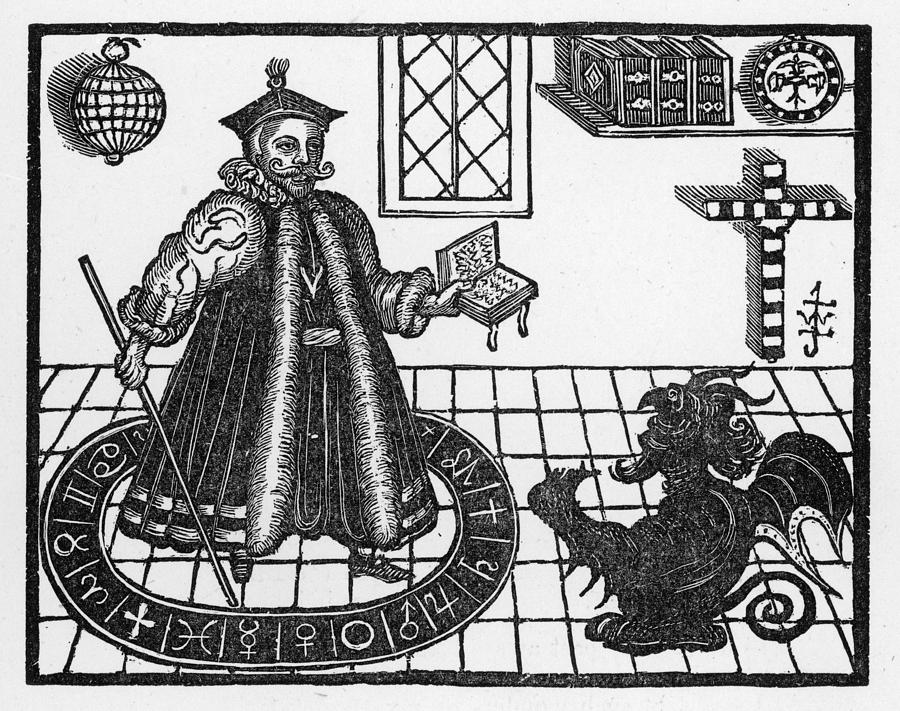A guest post by Stephanie Collins
At the end of his life, Faustus’s despair drives him to madness. This madness is one specific to the culture of Calvinism and predestination in which Marlowe was writing, and is something many actors and directors find difficult to stage. It is difficult, in a post-Freudian age, not to judge Faustus’s actions as the product of mental illness. Faustus’s feelings are alien to us because his religion is. The concept of assured damnation, assured from birth, is not one we typically hear about in contemporary religious discussion, but it was a major concern for Marlowe, whose time at Cambridge University was contemporaneous with that of renowned reformer and Calvinist William Perkins.

Woodcut of Faustus summoning Mephistopheles (dated 1663)
The realization that his mortal actions have consequences for his immortal soul has fully hit Faustus by 5.2, and he begins to hallucinate. ‘See, see, where Christ’s blood streams in the firmament!’, he cries, though there is no one onstage to hear him: is he calling to the audience, in a futile attempt to get them to see what he sees? Faustus’s hallucinations are a product of his religious despair: his belief in predestination means nothing he can do will change his hellish fate: he tries to ‘leap up to [his] God’ but is pulled down by unknown, and presumably unseen forces, since the devils do not enter until later.
Predestination theory was known to cause suicidal despair, and this, combined with the scholarly melancholy which begins Faustus’s journey to the devil, is the cause of these hallucinations. Early modern medical theory on melancholy was quite clear that sufferers experienced terrible dreams and visions, and Faustus’s vision of God’s angry face, and Christ’s blood streaming just too far away from him to save his immortal soul, are certainly products of this very specific kind of melancholia.
Faustus’s final soliloquy is full of action: as well as leaping up and being pulled down, he begs for the stars to ‘[s]tand still,’ for mountains to fall on him, for the earth to ‘gape’ open, for the stars to ‘draw up Faustus like a foggy mist’ into the clouds so he can be vomited into the air and ascend to heaven, and for his body to ‘turn to air’ so Lucifer cannot ‘bear [him] quick to hell’. Alas, however, the stars ‘move still,’ the clock ‘strikes,’ and the devil ‘will come.’ Despite his attempts to ‘headlong run into the earth,’ Faustus’s still corporeal body remains, for now at least, very much above ground. His efforts to ‘call on’ Christ fail and end with him calling on Lucifer instead. This soliloquy is a mass of actions, and almost contains within itself stage directions for the frantic Faustus to enact. The theatricality is obvious, including a call for Faustus to throw himself at the stage floor itself, in physical rebellion against his fear. It is a testament to the performativity of madness in the period: simply follow the stage directions Faustus gives, and you can convincingly embody madness. Faustus repeatedly attempts to regain control over his body, his melancholy, and his fear; all these actions fail, however, and he is unable to turn to air, or be saved by Christ. He cannot even ‘leap up’: the truth is, it is Faustus’s melancholic despair that pulls him down, no supernatural force. Faustus’s despair keeps him from salvation. In the same way, it is Faustus’s belief in his own reprobation, which, it becomes clear through the words of the Old Man and the Good Angel, is not predestined, that causes him to sin, and therefore causes his descent to hell.
But how are we, as modern audience members and theatre practitioners, to understand the things Faustus hears, sees, and feels? How best to act and stage hallucinations is a difficult question for theatre practitioners: do you let the audience in on the hallucination, and risk bathos, or challenge the actor to portray the terror of these moments alone? In Faustus’s final soliloquy, to enact each action as he recites them would be more laughable than it is empathetic, and so fortunately most directors choose the latter option. Yet this creates further difficulties: do the audience respond to Faustus in an empathetic way, or do they feel distanced because of the intense torment Faustus is suffering? Do we want them to empathize with him at all? He is, after all, a prolific sinner, offering to sacrifice ‘new born babes’ to Lucifer.
Act 5, Scene 2, with its terrifying hallucinations and melancholic despair, becomes one of the hardest parts of Doctor Faustus to stage. Stemming from a disease that for a modern audience is difficult to understand, the final soliloquy bustles with activities which cannot be completed. It becomes a final nod to the theatricality of Faustus’s lifestyle, with its grandiose gestures and promises of greatness, all of which ultimately fizzle to nothing, mere stage trickery, like the devil himself.
Stephanie Collins is a final year PhD candidate at the University of Leicester. Her thesis, ‘Men like Stage-Players Act Variety of Parts’: Performing Melancholic Parts on the Early Modern Stage, explores the role medicine, specifically the different forms of the melancholic humour, plays in a wide variety of dramatic texts from the 1580s-1620s. This piece on hallucinations in Doctor Faustus stems from her thesis research on scholarly melancholy. Outside of melancholy, her research interests include early modern witchcraft, staging violence, and diseased/deceased bodies, and she is particularly concerned with encouraging collaboration between researchers and performers: a cause she promotes with her own work in the theatre.